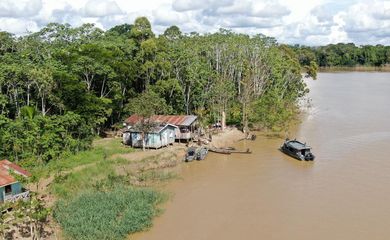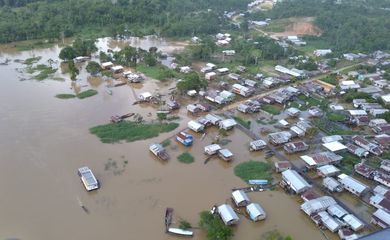Vale do Javari: non-indigenous population also lives with violence

To enter the Javari Valley , the visitor needs to travel through some cities in the Amazon. After arriving in Tabatinga, where the nearest airport is located, you need to take a boat to Benjamin Constant and, from there, a car to Atalaia do Norte. All this in the midst of the immensity of the largest tropical forest in the world and close to the Amazon Triple Frontier, a region of intense conflicts due to drug trafficking and land interests.

The distance between the towns of Benjamin Constant and Atalaia do Norte, where the headquarters of the Union of Indigenous People of Vale do Javari (Univaja) is located, is about half an hour by car, when there is no rain to delay the trip.
In the surroundings and on the road connecting the two cities there is no lack of symbols of those who hold power: Masonic lodges, units of the Universal Church of the Kingdom of God, the Assembly of God, and other religious congregations are always present in the landscape.
Still on the road, a tuk-tuk, a kind of motorized tricycle, smashes soda and beer cans on the oncoming lane. A bulldozer digs up garbage dumped on the grass, in the open, amidst vultures. In this extreme north of the country, it is possible to see that Atalaia shares some of the problems seen in large urban centers.
In Atalaia, most of the houses are wooden. Some are on stilts, which stand over a dark water. Near the port, where catraias (small boats that look like speedboats) arrive and depart, tearing up the river, there are more properties with glass in the windows, which, after a walk into the interior of the city, proves to be a rarity. There are no culverts to drain the rainwater. And there is a large number of half-built properties.
"Karla" and "Patrícia"
Atalaia do Norte is the hometown of sisters Karla and Patrícia. They live in their own skin some of the dramas that affect the municipality. Karla is a victim of domestic violence and says that when she lived with her husband she was constantly beaten and prevented from working by excessive jealousy. The aggressions began during the pregnancy of her first son, now 8 years old.
After several episodes, she decided to denounce her partner, who was taken by the police to the police station. "The day it happened, he was breaking everything inside the house, and my two children were witnessing everything," she recalls. At the police unit, he committed suicide.
Karla says that she finds it hard to accept the fact and that she felt a judgment, by the local society, for her husband's death. We left here [the city of Atalaia]. It is as if I had killed him. At night, the police took me to Benjamin, by river, because they said that some families were after me, to kill me. When I arrived, my aunt hid me, as if I had really done it. They were already going to send me to Peru. I saw very little of his wake," she recounts.
After her husband's death, which was three years ago, Karla decided to take a technical nursing course. However, she still faces obstacles to get a job - which she attributes, in part, to the local society's imaginary that she is to blame for her husband's tragic death. Factors such as the region's unemployment rate and the occupation of jobs by political appointments are also factors.
Karla's résumé includes only odd jobs, but no formal employment contract. A picture that is also seen in the country's official data. In 2022, the number of people without a signed work card increased 14.9% in relation to 2021 and reached 12.9 million. In Atalaia do Norte, only 7% of the population of 15,000 was employed in 2020.
Sexual Violence
While waiting for a job to guarantee financial autonomy, Karla counts on the support of her family. Her younger sister, Patricia, is one of the people who guarantee this support, but she also faces difficulties to enter the formal labor market.
Patrícia went to Peru twice in search of job opportunities. The first time, in 2014, lasted only a short time, due to a lack of a network of contacts in the neighboring country. On the second attempt, in 2019, she met her current husband, who is Peruvian. Together, they opened a clothing manufacturer that went bankrupt. To try to save the business, they borrowed money from a loan shark, but they were not successful.
Today, Patrícia's source of income is from selling cakes. "It's hard for him [her husband] to get a job here, he doesn't speak the language," she says.
Besides the similarity regarding the lack of professional perspective, the sisters share a sad history: they are victims of gender violence. Patrícia says that she began to suffer sexual abuse, from a neighbor, when she was 8 years old. But she cannot remember when the aggressions ended. Her only son, an 11-year-old, is the result of rape.
Patrícia does psychological counseling. "I sought help because there came a time when I thought about taking my life, because of this issue, because people always make me feel guilty about it."
For her, public policies to protect children and adolescents are fundamental to prevent cases like hers from happening again. "Sometimes the person is not arrested, for lack of evidence. But what evidence? The person is there telling her story. Nobody is going to make that up," he adds.
Over the last decade (2012 to 2021), 583,100 people were victims of rape and rape of a vulnerable person in Brazil, according to police records. According to the Brazilian Public Security Yearbook, in 2021 alone, 66,020 police reports of rape and rape of the vulnerable were registered in Brazil, a rate of 30.9 per 100,000 and a 4.2% growth over the previous year.
Sexual violence in Brazil is, in most cases, a crime perpetrated by an acquaintance of the victim, a relative, a colleague or even an intimate partner. The fact that the perpetrator is known to the victim makes the crime even more complex and reporting it a challenge for the victims. There is also a strong concentration of this crime in childhood: 61.3% of all victims were children and adolescents between 0 and 13 years old.
Agência Brasil asked the city hall of Atalaia do Norte for a position on measures to generate employment and combat gender violence. It also asked for a response on policies aimed at children and adolescents and is awaiting a response.




